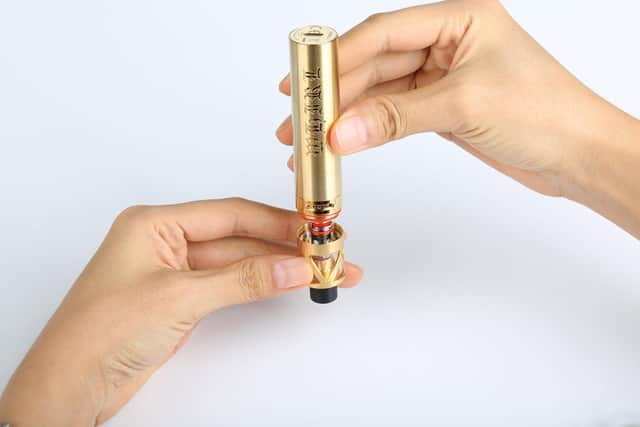Vaping on NHS backed by more than a third in survey


More than a third of those asked in a new survey believe they should.
GoSmokeFree.co.uk questioned 1,200 respondents to gauge their views toward vaping as a means of helping smokers cut down their tobacco use and subsequently, reduce the overall harm to society.
Advertisement
Hide AdAdvertisement
Hide AdA significant 35 per cent thought vaping products should be made available on prescription, considering their benefits in terms of helping cigarette smokers kick the habit.


Given the risks associated with smoking, not only for the individual but those around them as well, 38 per cent of those surveyed thought the government should make cigarettes illegal.
Additionally, 45 per cent – so nearly half – said they don’t think anti-smoking laws are tough enough, which could be why so many would support the illegalisation of cigarettes.
In Scotland, around one in five of adults still smoke cigarettes, making it a leading cause of preventable ill death, premature death and disability.
Although not completely risk-free, e-cigarettes do not produce tar or carbon monoxide, two of the most harmful components of tobacco smoke.
On its website, NHS Scotland has discussed the use of e-cigarettes and explains how they can help manage nicotine cravings for tobacco users who are trying to quit.
But e-cigarettes are not at present available on prescription on the NHS; tobacco alternatives are rather, regulated as consumer products.
In 2017, the annual Stoptober campaign was the very first time the UK government had promoted the use of e-cigarettes as a tool for helping tobacco smokers ditch the unsavoury habit.
Advertisement
Hide AdAdvertisement
Hide AdThe first time the UK government promoted the use of e-cigarettes, as a tool for helping tobacco smokers to ditch the habit, was during its annual Stoptober campaign in October, in 2012.
The stop-smoking campaign encourages people not to smoke during the month and beyond. Research shows if a smoker can stop for 28 days, they are far more likely to quit completely.
Stoptober has helped to encourage 2.3 million cigarette smokers to make an attempt to quit since it was launched a decade ago in 2012.
The pandemic affected the habits of many people, with lockdowns having a negative impact on people’s tobacco usage: a recent survey of current smokers found almost half said they have been smoking more since the beginning of the first lockdown and 43 per cent of which said this increased usage was out of boredom.
Seven per cent of people in Scotland use e-cigarettes, and of those adults who used e-cigarettes or vapes in an attempt to quit tobacco usage, more than half (59 per cent) found this method helped them successfully stop for a month or longer.
The survey by GoSmokeFree also found that of those ex-smokers who changed their habit to vaping, nearly half (44 per cent) said the biggest benefit of doing so has been that they feel healthier in themselves overall.
Over a fifth (22 per cent) of those who had switched to vaping said it’s far cheaper as compared to buying cigarettes.
In Scotland, the price of a 20-pack of cigarettes from the cheapest brand is around £9.50, whilst more premium market products sell at over £13 in many supermarkets.
Advertisement
Hide AdAdvertisement
Hide AdWith smokers consuming an average of around 12 per day, cigarette smoking can quickly become an expensive habit if continued over a long period of time.
Another 18 per cent of those who had switched to vaping said the biggest benefit has been that vaping feels safer in general - perhaps because it does not involve the use of a flame, nor does it produce carbon monoxide or tar, like cigarettes do.
Nearly one in 10 (nine per cent) of those who now vape said they find the variety of vape products on the market the biggest benefit of quitting tobacco, while seven per cent said they personally prefer the fewer after-effects of vaping, as compared to cigarettes.
Despite there being calls to make e-cigarettes available on prescription, nearly three in four (72 per cent) survey respondents said they do not believe health authorities have done enough to encourage smokers to kick the habit by switching to e-cigarettes or vaping.
Additionally, more than half (58 per cent) said they believe tobacco users should pay more tax, considering the increased burden that smoking-related problems place on the NHS Scotland.
More than half (54 per cent) weren’t even aware that the cost of treating tobacco-related illness to the Scottish government is up to £780 million each year.
However, this excludes the cost of ill-health due to second-hand smoke exposure and doesn’t account for the repercussions of smoking-related ill-health to the country’s economy.
GoSmokeFree.co.uk said when it comes to encouraging smokers to switch to healthier habits, it seems respondents believe cost plays a significant factor in doing so.
Advertisement
Hide AdAdvertisement
Hide AdIn a similar way that some people think cigarette smokers should pay more taxes for placing an increased burden on the NHS, more than half (54 per cent) believe vaping products and e-cigarettes should be tax-free to help prompt smokers to change their habit.
There are numerous benefits associated with a reduced smoking rate across the country - both for smokers themselves, as well as communities in general.
Not only will reduced tobacco use rates save the government a significant number of costs linked to cigarettes, but overall health benefits are also said to include reduced risk of cancers, including throat, lung, stomach, and oesophagus; reduced risk of cardiovascular disease; decreased chance of developing stomach ulcers.; decreased impact to the environment and less exposure of non-smokers to harmful second-hand cigarette smoke.